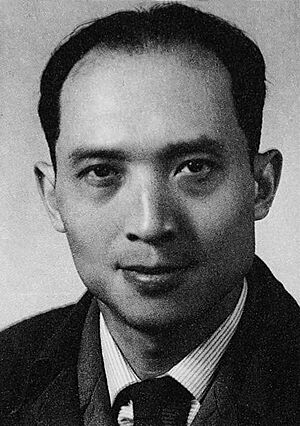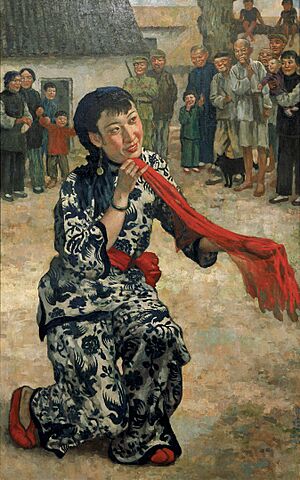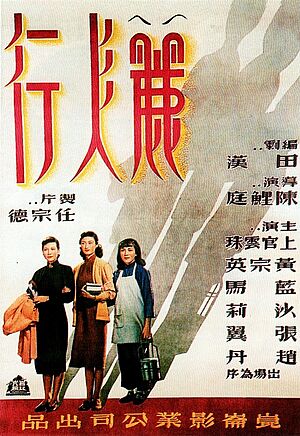Chen Liting facts for kids
Quick facts for kids
Chen Liting
|
|
|---|---|
| 陈鲤庭 | |
 |
|
| Born | 20 October 1910 Shanghai, China
|
| Died | 27 August 2013 (aged 102) Shanghai, China
|
| Other names | Chen Sibai (陈思白) |
| Alma mater | Daxia University |
| Occupation | Playwright, director, screenwriter, film theorist |
|
Notable work
|
Put Down Your Whip Qu Yuan Far Away Love Women Side by Side |
| Spouse(s) | Mao Yinfen |
| Children | Chen Maoni |
Chen Liting (Chinese: 陈鲤庭; pinyin: Chén Lǐtíng; 20 October 1910 – 27 August 2013) was a famous Chinese playwright (someone who writes plays), drama and film director, screenwriter (someone who writes movie scripts), and film theorist (someone who studies movies). He was one of the most important film directors and writers in China before the Communist Party took over. His most well-known film was Women Side by Side (1949).
Chen had a tough start in life. He was left alone as a baby and later lost both his foster parents. Before making movies, Chen mostly worked in theatre. His play Put Down Your Whip was very popular. It was performed many times during the Japanese invasion of China. During the war, he also directed the famous play Qu Yuan. He also wrote one of the first Chinese books about how movies work.
After the early 1950s, the Chinese government often stopped Chen from making films for political reasons. He worked as a general manager for a film studio. He was later put in prison during the Cultural Revolution. After this difficult time, he spent three years on a historical film called Da Feng Ge. But this film was also cancelled due to politics. He then retired from filmmaking.
Contents
Early Life and Education
Chen Liting was born in Shanghai on 20 October 1910. He was abandoned as a baby and adopted by foster parents. Sadly, he lost his adoptive father when he was four. Three years later, his adoptive mother also passed away. Chen was then raised by his uncle.
At age 12, he went to a boarding school in Jiangyin. In 1924, he started at Chengzhong Middle School in Shanghai. As a high school student, Chen became very interested in modern drama. In 1928, he went to Daxia University in Shanghai. There, he translated, directed, and acted in an Irish play called The Rising of the Moon. This was the first time this play was performed in China.
Put Down Your Whip Play
After university, Chen taught at a primary school outside Shanghai. In late 1931, he wrote a patriotic play called Put Down Your Whip. It was inspired by an older play. This new play became incredibly popular and was performed countless times across China. This happened during the Second Sino-Japanese War.
Both amateur groups and famous actors performed the play. The actress Wang Ying even performed an English version for President Roosevelt and his wife at the White House. The play was so powerful that Chinese media called it a "spiritual atomic bomb" against the Japanese invaders. It also inspired famous paintings by artists Xu Beihong and Situ Qiao.
Work During the War
Chen returned to Shanghai in 1932. He wrote film reviews and translated Soviet books about filmmaking. When the Japanese invaded China in 1937, Chen joined the resistance movement. He led a group called the Shanghai Salvation Drama Troupe. They performed many patriotic street plays, including Put Down Your Whip.
The troupe left Shanghai before it was taken by the Japanese. For the next three years, they traveled and performed under tough conditions across central and southwest China. In 1941, Chen arrived in Chongqing, which was China's wartime capital. He joined government film studios there. However, he mostly worked in theatre. He directed plays by famous writers like Wu Zuguang and Xia Yan. His most impressive work during the war was directing Qu Yuan, a famous play from 1942. In 1942, he also published Rules of Cinema. This is seen as the first complete Chinese book about film theory.
Post-War Films (1945-1949)
After Japan surrendered in 1945, Chen went back to Shanghai. He joined a new film studio set up by the government. He wrote and directed the film Far Away Love. Its premiere on 18 January 1947 was a big event in Chinese cinema after the war. The film starred famous actors like Zhao Dan and Qin Yi. The government even gave Chen uniformed soldiers to help with the filming. This film was the first of several important movies about the social problems caused by the war. In late 1947, he made another film called Rhapsody of Happiness.
Chen then moved to a new private studio called Kunlun Film Company. There, he directed Women Side by Side in early 1949. Chen and the famous playwright Tian Han wrote the script together. This film is his most famous work and is considered his masterpiece.
Life in the People's Republic of China
After the People's Republic of China was founded in 1949, Chen directed two more films: Inescapable (1950) and Work Is Beautiful (1951). But he mostly worked in management roles. He was a member of the National People's Congress and general manager of Tianma Film Studio from 1957 to 1966.
In the 1950s, Chen was chosen to direct a film called Li Shizhen. But he insisted that the director, not government officials, should control the artistic choices. Because of this, he was removed from the project. His friend Shen Fu directed the film instead.
In the early 1960s, Chen spent three years getting ready to make a film about the life of Lu Xun, a famous writer. But the film was cancelled by a high-ranking official for political reasons.
Like many other smart people, Chen was put in prison during the Cultural Revolution (1966–76). After this period ended, he was cleared of any wrongdoing. He returned to work for the Shanghai Film Studio, where he was in charge of artistic quality. He and Chen Baichen worked together for three years on a historical film called Da Feng Ge. This film was about old palace struggles. However, the film was again cancelled by powerful politicians. They felt it was too similar to recent political problems. Chen Baichen had a heart attack when he heard the news. Chen Liting, who was almost 70, then retired from filmmaking.
In 2008, a book about Chen Liting's life was published. It was called Far Away Love, named after his film. He also received an award from Chinese President Hu Jintao for his "exceptional contributions to the art of drama."
Chen Liting passed away on 27 August 2013, in Shanghai, at the age of 102.
Family Life
Chen Liting married Mao Yinfen during the Great Leap Forward. They were married for almost 40 years before she passed away on 18 September 1998. They had one daughter, Chen Maoni, who later moved to the United States.



